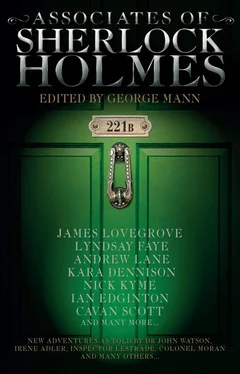But my curiosity over Mary’s wider circumstances had been piqued. Therefore I returned to the Catholic church the next afternoon.
The priest was as good as his word, and even pointed out which pages in the great ledger might be relevant to the Fraser family, “Although,” he added, “these entries only tell part of the story.” I took this to mean that my enquiries still intrigued him.
I soon located records of Eileen Fraser’s marriage, the birth of her daughter a scant and scandalous eight months later, then two years after that, of a son. The son’s death was also recorded, four years ago, shortly before Mary came to my school. There was no other issue listed.
I found the priest tidying the votive candles outside the vestry and said, “I am afraid you were right.”
“About what, madam?”
I did not correct his assumption about my marital status. “The records show only bare facts. I am not sure how helpful these will be to poor Mary.”
He looked down at the candle in his hand and frowned. But he did not make his apologies or move away, so I prompted, “Though divorce may be a sin, separation is sometimes for the best, is it not?”
He looked up and placed a candle on the table. “I would not want to repeat hearsay. Gossip never does the Lord’s work.”
“In that we are agreed. I wish only for confirmation of the facts. Mr Fraser does not live with Mrs Fraser, is that correct?”
“He does not, no.”
“But he has not moved away?”
“It might be better if he had.”
“Ah. So his continued influence is not a wholesome one. I am sorry, that takes us into the realm of gossip and opinion.”
“No, it is a reasonable supposition. Mr Fraser was never a likeable man, especially when thwarted. By all accounts excess money and a lack of human contact have caused him to twist in on himself.”
I suspected that the weight of confession, formal and otherwise, lay behind this young priest’s willingness to open up to a stranger. His soft heart was a credit to his calling. “I imagine that knowing her husband is in such a dark place does nothing to help poor Mrs Fraser’s health,” I said.
“Indeed not. Though they have little contact, thank the Lord.”
“And she lost her youngest, I see.”
“Ah yes. A tragic accident.”
“May I ask how it happened?”
“I should not say more.” I understood his reticence, given the mother of the dead child was still one of his flock; I would exercise the same tact with my girls. But then he continued, “There has been an interesting recent development in the family that I can share, though I am not sure it is of relevance to young Mary’s situation.”
“Oh?”
“It concerns another family member, one who has slipped far from the faith.”
I had a sudden, unpleasant, suspicion. “Please,” I said, my throat tight, “do go on.”
* * *
“Will you not sit down, Miss Hunter?”
“No, Mr Connor, I will not.” I would rather not have had this conversation in public, nor did I wish to be alone with Mr Connor. Any townsfolk who chose to visit The Singing Kettle today in the hopes of seeing something of interest would not be disappointed.
“Please, what is wrong?”
“Why did you not tell me you were related to one of my pupils?” Though I kept my voice low, I would not speak names where they might be overheard.
“One of… oh, you mean my cousin’s girl?”
“Yes, your cousin who was Eileen Connor before her marriage.” When I had read Mary’s mother’s maiden name in the church register I had thought nothing of it, but then the priest told me of the cousin newly returned from America and it had all fallen into place. I had the how of the matter in that scrap of white fabric; the why , I admit, was still to come; but here, surely, was the who : a member of that ill-fated family, with some knowledge of my school, quite capable of scaling a wall covered in a knotty growth of a wisteria to hang a rope from that hook.
“I did not think it relevant. I was under the impression that the last thing you wanted to talk about with me was the school which takes up so much of your life.”
Perhaps he had a point, but I would not be deflected. This man took an active interest in the so-called supernatural. Quite how faking a haunting would further his cause I could not yet say, but he had to be involved somehow. “Mr Connor, I am no more inclined to believe in coincidence than I am in ghosts.”
“I’m sorry, but I am not sure what—”
“That is enough. I do not want to hear another word.” As I turned on my heel every eye was upon me. But I did not look back.
* * *
When I took Mary aside and explained the matter of the ghostly hoax she listened in silence. When I asked who she thought might perpetrate such an unpleasant prank she shrugged. I saw relief in her, but uncertainty too. I hoped the truth would soothe her, but she was such a fragile thing, and I did not want to press the point.
Perhaps, in a few weeks, I might be able to objectively analyse Mr Connor’s part in the affair, to work out what he sought to gain or achieve. For now, I determined not to think of him at all.
I interviewed Mary’s senior dorm-mates individually, a process carried out with some delicacy, as I wished both to reassure them and to find out whether they had any more to add to this not-quite mystery. They did not.
Similar tact had to be employed with the servants. It would not do to act without evidence.
On Tuesday evening, to my surprise, Mary came to see me.
I showed her into my office, and waited for her to speak. She sniffed, blinked and said, “Please, Miss Hunter, don’t send me away.”
“Why would I do that, Miss Fraser?”
“Because of the trouble I’ve been.”
Aside from a complaint about her snoring, which could hardly be helped, Mary had been no trouble at all since moving beds. “The past is the past, Mary. And as I explained, there was no ghost. All is well.”
“So I can stay?”
“Of course you can. What makes you think otherwise?”
“The letter from Father.”
“What letter? When did he write to you?” I looked over all post before distributing it to the girls. I had seen no letter.
“Yesterday, miss.”
“Would you be willing to tell me what the letter said?”
“I… yes, miss. He said that seeing as how things were not working out here at the school, and how Mama’s health is getting worse, I should come home to him.”
“You live with your mother outside of term-time, yes?” Had Mrs Fraser gone through the process of a divorce from her unpleasant husband this arrangement would most likely have been overruled by the courts.
“Yes but… she is not well, and she’s getting worse. Her nerves… When Peter died it was horrible, and she never got over it.”
I quashed my unsatisfied curiosity at the circumstances of her little brother’s death. What mattered was the family’s current pain. “But you would still prefer to remain with her when you are not here, and not spend time with your father?”
“Miss, I would rather sleep in a ditch than enter that man’s house!”
I tried not to let my surprise at her passionate words show. “I can assure you it will not come to that.” But her desperate, if incomplete, account put a new light on the hoax that had disturbed my school.
* * *
I called the suspect to my office the next morning, having slept on the matter to ensure I had, as Holmes would say “all the data”. My suspect was Elizabeth Munton, a lanky girl from a large local family who had worked at the school for two years, reporting to the housekeeper. I had spoken briefly to her, along with all the other servants, when making my initial enquiries. At the time she had claimed to “not know anything about no ghostly prank” but had refused to meet my eyes, and the way she said “ghostly prank” implied she knew more than she was saying.
Читать дальше












